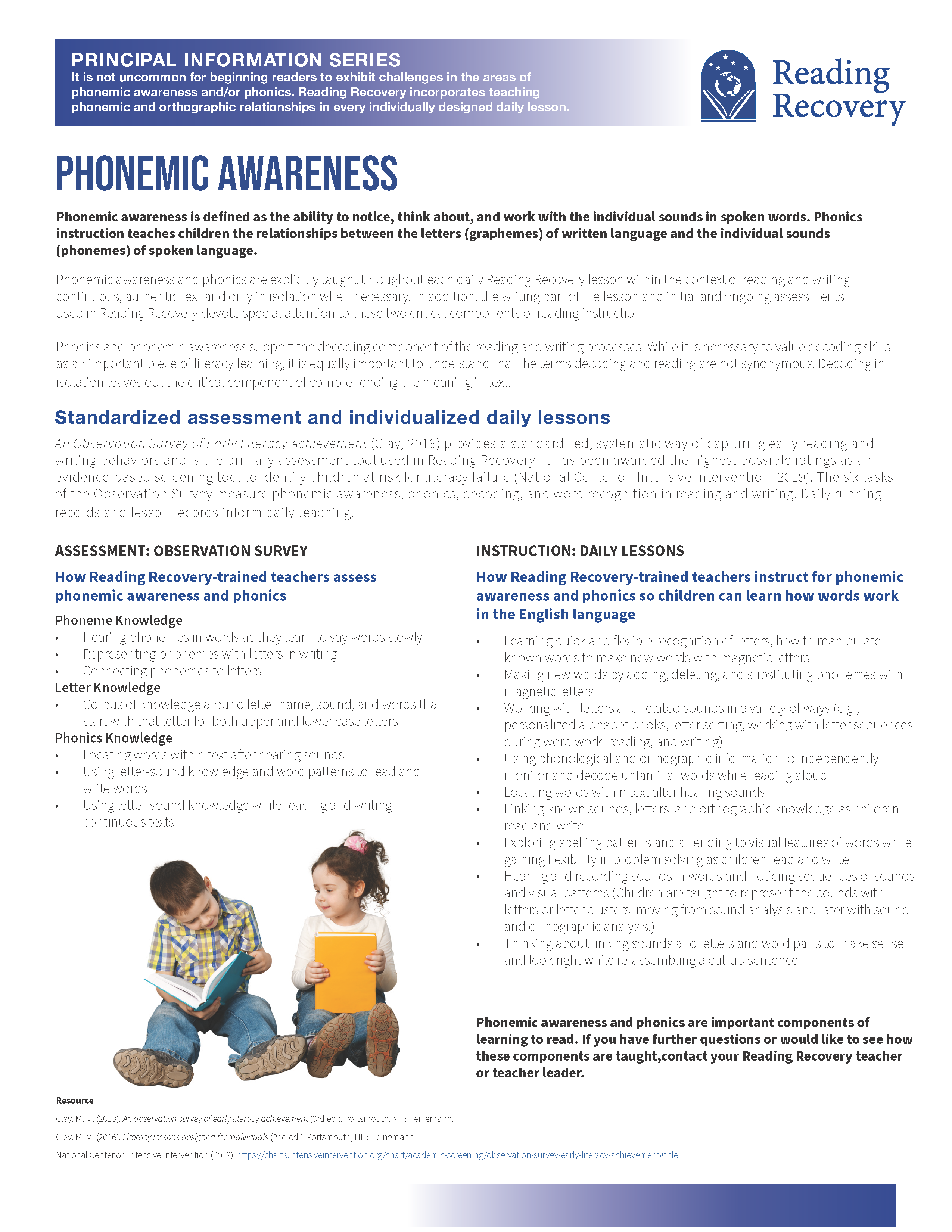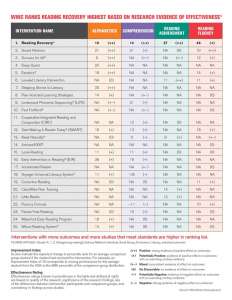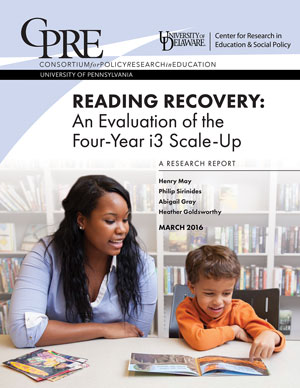Reading Recovery resources address dyslexia & learning disabilities
For Parents
How Reading Recovery Helps Your Child Learn
Explains how specially trained teachers build on the child’s strengths and address reading comprehension, phonics-related instruction in reading and writing, literacy processing, and independent problem solving throughout the series of lessons. View and download in Spanish
For School Administrators
Phonemic Awareness and Phonics in Reading Recovery
This brief single page resource explains how phonemic and orthographic relationships are incorporated in every individually designed daily lesson.

The Stories We Tell Ourselves: Reading Recovery and the MSV Myth
“Perhaps because of the myth of the three-cueing system, critics have often supposed that visual information is not emphasized or taught in Reading Recovery lessons. This is quite untrue and is supported by nearly four decades of empirical research which show Reading Recovery’s strong effects across all domains, including phonics, phonemic awareness, and comprehension.” – Jeffery Williams
From The Journal of Reading Recovery
Understanding Dyslexia Laws and Policies
Dr. Rachael Gabriel, University of Connecticut
Spring 2018 article examines dyslexia legislation observed nationally, discusses the dyslexia agenda, and examines its implications for educators for students with reading difficulties.
Communicating the Power of Reading Recovery and Literacy Lessons Instruction for Dyslexic Learners: An Ethical Response
Dr. Mary Anne Doyle, University of Connecticut
Spring 2018 article compares shared perspectives between Reading Recovery and dyslexia-specific programs, and important differences that demonstrate why the one-to-one intervention meets and exceeds the intent of an instructional approach deemed critical for dyslexic learners.
What’s the Fuss About Phonics and Word Study?
Dr. Patricia Scharer, The Ohio State University
Spring 2019 article identifies misunderstandings in literature over time and confirms how Reading Recovery teachers provide instruction in phonemic awareness and word analysis in both reading and writing activities of every lesson.
RRCNA Briefing Papers and Response Articles
Early Literacy Matters: Dyslexia, Specific Learning Disabilities, and Reading Recovery
Briefing paper provides information for Reading Recovery professionals to begin conversations with special educators, classroom teachers, school leaders, and parents in support of struggling readers. Illustrated are three aspects of a comprehensive approach to early intervention—early identification of struggling readers, instructional components of intensive intervention, and a response to intervention (RTI) framework.
Response to Farrall’s Article on Wrightslaw Website: A Review of What Research Really Says About Reading Recovery
This issue paper was written in response to the 2006 attack by Melissa Farrall posted on the Wrightslaw Special Ed Advocate website. Her claims reflect incorrect, misleading, and bias reporting about Reading Recovery; many of the same inaccuracies often perpetuated by critics of the intervention.
Ideology and Early Literacy Evidence: A Response to Chapman & Tunmer (2015)
In response to their political analysis of Reading Recovery and the research that provides evidence of effectiveness, Robert Schwartz addresses new attacks in the authors’ long history of criticisms and counters their argument that Reading Recovery “should be dropped and replaced by a more contemporary, research-based, reading intervention approach, together with more effective literacy instruction in children’s first year of schooling.
Dispelling Misrepresentations and Misconceptions About Reading Recovery
Reading Recovery Council of North America (2012)
White paper written in response to the International Dyslexia Association’s Fall 2011 Perspectives on Language and Literacy publication. All five articles in the themed issue discount various aspects of Reading Recovery. IDA did not provide RRCNA an opportunity to respond to the criticisms.
The Truth About Reading Recovery
2017 response to “The Reading Wars and Reading Recovery: What Educators, Families, and Taxpayers Should Know” by Cook, Rodes, and Lipsitz (2017) in Learning Disabilities journal
RRCNA article examines several of the most damaging false claims made by the authors including misrepresentations of decision-making evidence, misleading conclusions about sustained gains and the i3 report, confusions about selection of students, and erroneous challenges to focus of instruction.
Other Literacy Scholars
A distinguished group of literacy academics—all are members of the Reading Hall of Fame—express their deep concern with the April 30, 2019 PBS NewsHour’s segment on dyslexia. We share the letter with permission from the primary authors.
Literacy Scholars’ Letter to PBS
A comprehensive 2016 synthesis of the current understandings of dyslexia, written by the International Literacy Association Research Panel, and an addendum response to the IDA.
Dyslexia: An International Literacy Association Research Advisory
Addendum Response to International Dyslexia Association criticism
For more information
What Works Clearinghouse
Updated resource reflects the most recent research findings from WWC.
Final independent research report finds i3 scale-up ‘highly successful’
THE JOURNAL OF READING RECOVERY
Spring 2024
Constructing a More Complex Neural Network for Working on Written Language That Learns to Extend Itself by Carol A. Lyons
Reading Recovery IS the Science(s) of Reading and the Art of Teaching by Debra Semm Rich
Predictions of Progress: Charting, Adjusting, and Shaping Individual Lessons by Janice Van Dyke and Melissa Wilde
Teachers Designing for Context: Using Integrity Principles to Design Early Literacy Support in Aotearoa New Zealand by Rebecca Jesson, Judy Aitken, and Yu Liu





